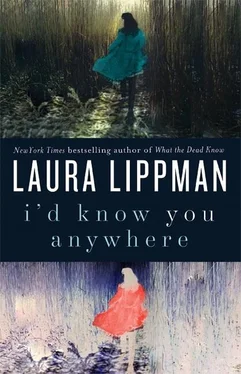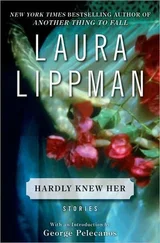But ultimately the statue made her think of her and Walter, the way they intersected. They were close enough now that they even squabbled like an old married couple. Certainly, Walter had the capacity to exasperate her like no one else on God’s green earth. He was secretive and a control freak to boot, an almost valiant temperament for a man on death row, who controlled nothing in his life. Every time they made a plan—every time—he changed it on her. First he said, Go slow, don’t rush, don’t worry. She’ll come see me and then I’ll bait that hook. Now he had decided just as arbitrarily to jump ahead several moves, just like that, no explanation.
Yet Barbara had already set Plan B in motion, at Walter’s insistence, and there was no calling it back. So here she was, parked outside Penn Station on a sunny October day, waiting for the Amtrak from Philadelphia. She frowned at a driver idling in the drop-off lane, which was clearly marked, ignoring the line of cars backing up behind her, the chain reaction of problems she was causing. She should be in the waiting lane, like Barbara, or parked on the traffic circle. Barbara hated people who didn’t follow the rules. She gave her horn a little tap, tried to get the driver’s attention, but the woman was clearly an expert at tuning out the world. Barbara got out of her car and walked over, rapped on the woman’s window, forcing her to roll it down and acknowledge Barbara’s presence.
“You’re in the wrong lane,” she said to the driver.
“I pulled in by accident and I’m only going to be a minute,” the woman said. “People can still get around me.”
“Not that easily, and traffic is backing up behind you clear to St. Paul Street. Just pull around the circle and you can get in the correct lane to wait.”
“Do you work here?”
Barbara wasn’t one to be derailed by irrelevant questions. A person didn’t have to work somewhere in order to insist on civility and order. “You really should pull around.”
“And you should mind your own business.”
Barbara took off her sunglasses, which not only allowed her to make eye contact, but also showcased her scar, that phantom smile. She wasn’t deluded enough to think it made her look tough or intimidating. But she believed that it announced that she had lived in this world, that she knew things others did not. “I’m sure you think you’re the special case, that you have all these rationalizations for behaving as you do. But you are one person inconveniencing many, and there’s ultimately no way to rationalize that . Is your presence in this line a matter of life and death? Will someone suffer if you do what everyone else is doing, without a fuss?” Even as Barbara was speaking, cars were pulling around, honking and squealing, the drivers making irked faces. They seemed to lump her in with this woman, think she was part of the problem. But now that they were in a standoff, pride was involved. Pride—someone else’s—had almost killed Barbara. Still, she couldn’t back down.
“I will take down your tag number,” she said. “And make a complaint. Did you know that citizens can do that? Complain to the MVA about other motorists’ bad behavior?” She wondered as she said this if her threat might be true. It should be true, and that was good enough.
The woman looked balefully at Barbara, put her car in gear, and lurched forward, almost running over Barbara’s foot in the process. You would think that cars that had been stalled behind her might show Barbara a little gratitude for breaking up the bottleneck, but they just drove furiously past, dropping off their passengers with no acknowledgment of Barbara’s efforts for them. She dashed across the lane to her own properly parked car, but even before she could open the door, she saw her visitor coming out of the station, a colorless, meek-looking man in a sports jacket and a homburg. She recognized him by his tentativeness, the wary, unsure glance of a person being met by someone he doesn’t really know. She flung up an arm, waved him over.
“Ms. LaFortuny?” he asked.
“Mr. Garrett,” she said, shaking his hand. “I’m such a fan.”
Now that was a lie. She was really piling them up today. She and Walter both considered Garrett’s book a joke, a travesty. But he might be useful, if deployed correctly, and wouldn’t that be a great joke on him?
“How was your trip?” she asked.
“Uneventful,” he said. “I guess that’s all one can ask for. I can’t believe government subsidizes that service.”
She knew she shouldn’t argue with him, but she hated that kind of knee-jerk critique. “I believe the northeastern routes make money for Amtrak. Besides, this country needs more rail service, not less.”
“The covers were torn on half the seats,” he said. “And there was no coffee in the café car.”
“Do you want a cup of coffee? There’s a Starbucks not even three blocks from here—”
“No, I’m fine. I just think that’s outrageous on general principle.”
So it was going to be that kind of day.
She drove toward the county, taking him on a tour of the Lerners’ old neighborhood, driving into the state park, circling back to the now rather worn-looking neighborhood where Maude Parrish had lived. He claimed to have seen these sites before, but Barbara doubted him. Garrett was a lazy man, according to Walter, content to sit in a courtroom and read official records but reluctant to initiate anything on his own. He had never spoken to Walter’s sister, for example, never even tried as far as they knew. (Thank God, given her feelings, but still, how hard would it have been?) He hadn’t even been particularly dogged about getting to Walter, or his lawyer. But that way, he didn’t have to deal with all the messy contradictions. Long before the Internet and blogging, Jared Garrett had the thumb-sucking incuriousness of a person who can’t be bothered to muddle his theories with fact. He now kept a blog on cold cases, throwing up his wildly speculative ideas willy-nilly. His grammar was suspect, and as best as Barbara could tell, he couldn’t even be bothered to spell-check half the time.
They stopped for a late lunch in Clarksville. They were only a few miles from where the Lerners lived. She wondered if Garrett had even gleaned that much information, which was available via property records.
“Vegan?” he said with dismay, studying the menu.
“You’ll never know. I ate here before the switch and found out that most of the entrées I liked were vegan all along.”
He ordered the chili, which Barbara knew to be absolutely delicious, but seemed glum about it. He was probably not much older than Barbara, but he had a bowling ball of a gut and a terrible pallor. Why did people treat themselves so horribly? Barbara was well aware that she had the great gift of leisure, that it was easy for her to go to yoga class and shop the farmers’ market and choose healthful restaurants, but this man was clearly making no effort to take care of himself. She thought of Walter, struggling to maintain his health in prison. She had sent him books with basic yoga instruction and he had adopted a vegetarian diet despite much protest from prison officials, who wanted to honor dietary needs only for religious or medical reasons. Fine, Walter had said, I’m a Muslim now. Put me on the vegetarian diet that you give them.
“Ms. LaFortuny—”
“Barbara.”
“I don’t mean to be rude and I’m sure you mean well, but when you approached me and said you had significant new information to share, I expected more than a tour of places I saw twenty-some years ago.”
“Things change. I thought it might be helpful for you to revisit places, see them anew.”
Читать дальше












